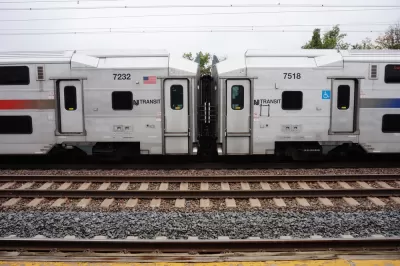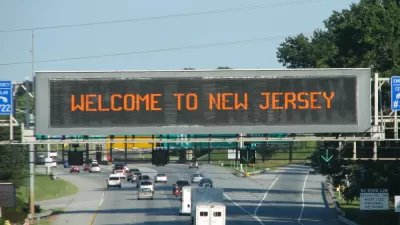The New Jersey Transit system, with an operating budget reduced to 10 percent of its 2009 total, has become more of a vessel for nepotism than a provider of safe transit service, according to a recent editorial.

"On Oct. 21, the commissioner for the state's Department of Transportation told lawmakers that all those economic sob stories were exaggerated, and that New Jersey Transit has 'sufficient money to fund its operations,'" begins an editorial by the New Jersey Star-Ledger. Yes, there's a "but" coming: "Two weeks later, the new executive director of NJ Transit established that Chris Christie's man in charge is clueless," writes the editorial board.
The executive director who dropped the truth bombs on the situation at New Jersey Transit is Steven Santoro, who recently spent four hours testifying that the administration of Governor Chris Christie "allowed a $3 billion agency to deteriorate into an industry disgrace," now "used as a cushy stopover for the governor's political cronies."
According to Santoro's testimony, the Christie Administration has had no trouble filling six-figure executive positions at New Jersey Transit, but has "neglected to fill 305 job vacancies related to safety needs."
This news is all of critical relevance due to the crash of New Jersey train #1614 at Hoboken Terminal in September. The New York Times published an article in October detailing the depths of the New Jersey Transit system's decline in October.
Back to the editorial, which makes a larger argument that budget cuts to transit operations have dire consequences. The Christie Administration has decreased the state subsidy for New Jersey Transit's operating budget from $348 million in 2009 to $33 million last year.
FULL STORY: N.J. Transit: It's worse than anyone thought | Editorial

Planetizen Federal Action Tracker
A weekly monitor of how Trump’s orders and actions are impacting planners and planning in America.

Congressman Proposes Bill to Rename DC Metro “Trump Train”
The Make Autorail Great Again Act would withhold federal funding to the system until the Washington Metropolitan Area Transit Authority (WMATA), rebrands as the Washington Metropolitan Authority for Greater Access (WMAGA).

The Simple Legislative Tool Transforming Vacant Downtowns
In California, Michigan and Georgia, an easy win is bringing dollars — and delight — back to city centers.

The States Losing Rural Delivery Rooms at an Alarming Pace
In some states, as few as 9% of rural hospitals still deliver babies. As a result, rising pre-term births, no adequate pre-term care and "harrowing" close calls are a growing reality.

The Small South Asian Republic Going all in on EVs
Thanks to one simple policy change less than five years ago, 65% of new cars in this Himalayan country are now electric.

DC Backpedals on Bike Lane Protection, Swaps Barriers for Paint
Citing aesthetic concerns, the city is removing the concrete barriers and flexposts that once separated Arizona Avenue cyclists from motor vehicles.
Urban Design for Planners 1: Software Tools
This six-course series explores essential urban design concepts using open source software and equips planners with the tools they need to participate fully in the urban design process.
Planning for Universal Design
Learn the tools for implementing Universal Design in planning regulations.
Smith Gee Studio
City of Charlotte
City of Camden Redevelopment Agency
City of Astoria
Transportation Research & Education Center (TREC) at Portland State University
US High Speed Rail Association
City of Camden Redevelopment Agency
Municipality of Princeton (NJ)



























